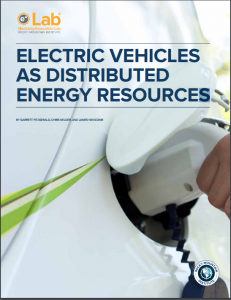Full Title: Electric Vehicles As Distributed Energy Resources
Author(s): Garrett Fitzgerald, Chris Nelder, And James Newcomb
Publisher(s): Electricity Innovation Lab, Rocky Mountain Institute
Publication Date: April 1, 2017
Full Text: Download Resource
Description (excerpt):
Considered as a pooled resource, the growing number of electric vehicle batteries could provide a wide range of valuable grid services, from demand response and voltage regulation to distribution-level services, without compromising driving experience or capability. Electric utility companies can use new communications and control technologies, together with innovative tariffs and incentive structures, to tap the sizeable value potential of smart electric-vehicle charging to benefit utility customers, shareholders, vehicle owners, and society at large. This will mean influencing, with increasing precision, where and when EVs are charged through a combination of partnerships, incentives, and market structures. In its early stages, the interesting challenges and opportunities related to vehicle grid integration will be local or even hyper-local, at the scales where gridrelated issues will first emerge.
Our review of the literature and numerous pilot projects, as well as some original modeling of state-level load profiles, confirms that EV charging alone can be integrated into the electricity system in ways that deliver net benefits to utility customers, shareholders, vehicle owners, and society at large. If utilities anticipate the load of charging EVs and plan for it proactively, they can not only accommodate the load at low cost, but also reap numerous benefits to the entire system.
